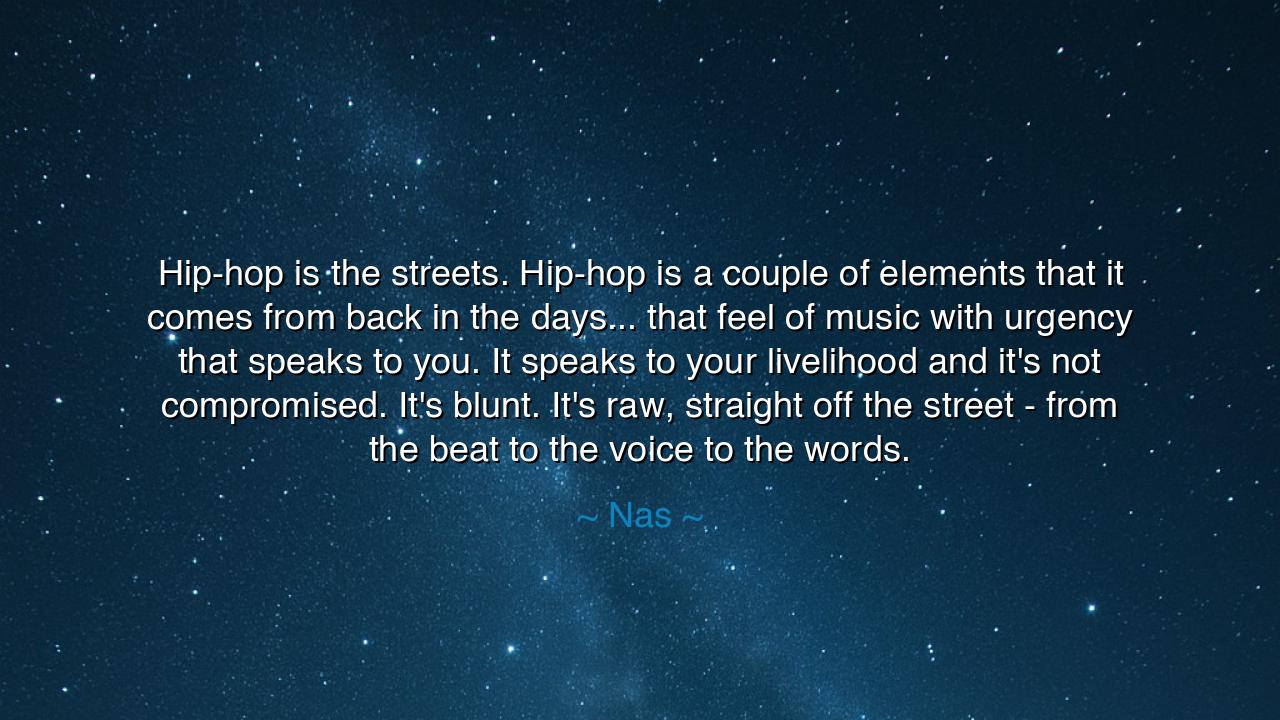
Hip-hop is the streets. Hip-hop is a couple of elements that it
Hip-hop is the streets. Hip-hop is a couple of elements that it comes from back in the days... that feel of music with urgency that speaks to you. It speaks to your livelihood and it's not compromised. It's blunt. It's raw, straight off the street - from the beat to the voice to the words.






The poet of the concrete jungle, Nas, once proclaimed: “Hip-hop is the streets. Hip-hop is a couple of elements that it comes from back in the days... that feel of music with urgency that speaks to you. It speaks to your livelihood and it's not compromised. It's blunt. It's raw, straight off the street—from the beat to the voice to the words.” In this declaration lies the soul of a movement, the birth of an art form forged in hardship, rebellion, and truth. For hip-hop was not created in ivory towers, but in neighborhoods where voices were silenced, and so rhythm and rhyme became the language of survival.
The ancients would have called such an art the cry of the oppressed, the chant of the people. For in every age, when rulers ignored the suffering of the many, a new song arose, filled not with polish, but with urgency. So it was with spirituals sung by the enslaved, with protest songs of the poor, and so it was with hip-hop in the burning heart of the Bronx. Nas reminds us that hip-hop is not about compromise, not about pleasing the powerful. It is raw truth—sometimes uncomfortable, always real—spoken in rhythm, carved into beats, and hurled into the world as testimony.
Consider the early days of hip-hop’s birth. The streets of New York in the 1970s were marked by poverty, violence, and neglect. Young voices, denied the instruments of wealth, turned turntables and microphones into weapons of expression. They painted walls with graffiti, spun records into beats, and battled with words instead of blades. In this way, hip-hop arose as a culture of survival, a raw fire born of necessity. What others discarded, they transformed into art. And like Nas said, it was blunt, uncompromised, because compromise had no place in a world where survival demanded honesty.
The urgency Nas speaks of is the very heartbeat of hip-hop. It is the sound of lives lived on the edge, of stories that cannot wait to be told tomorrow. Listen to Grandmaster Flash’s The Message, and you hear not entertainment, but prophecy: “Don’t push me, ’cause I’m close to the edge.” The words are straight from the street, unpolished but unforgettable, carrying the weight of an entire community’s struggle. This is the power of hip-hop—it speaks not of fantasy, but of livelihood, of the raw truths that others seek to ignore.
Even as hip-hop grew and spread across the world, its essence remained the same. Whether in the Bronx, Compton, Johannesburg, or São Paulo, it became the tongue of the unheard. Why? Because, as Nas reminds us, it is the voice of urgency. It tells the story of the streets without compromise, without apology. It is the poet’s voice sharpened into a blade, the beat of a drum that demands to be heard. In this way, hip-hop is both local and universal—it is born from a corner, but it speaks to the world.
The lesson for us is profound: never lose the raw truth of your voice. Whatever your art, your work, or your life’s calling, let it remain authentic. Do not polish away its urgency to fit the comfort of others. Do not compromise the story of your struggle, for it is your truth that will connect with others. Hip-hop’s power lies not in perfection, but in honesty. In the same way, your greatest power lies not in presenting a mask, but in showing the world your unfiltered self.
Practically, this means daring to speak plainly, to create boldly, to live truthfully. Write your story, tell your truth, sing your song, even if it is not smooth or polite. For the world does not hunger for perfect lies—it hungers for raw truth. Be like hip-hop: unafraid, blunt, urgent, and alive.
Thus, let Nas’s words be carried forward as a teaching: hip-hop is the streets, and it is truth unbound. It is a reminder that the most powerful voices are not those raised in comfort, but those born in fire, forged in struggle, and delivered with urgency. Live in this way, and your own voice, too, will echo across generations.






AAdministratorAdministrator
Welcome, honored guests. Please leave a comment, we will respond soon